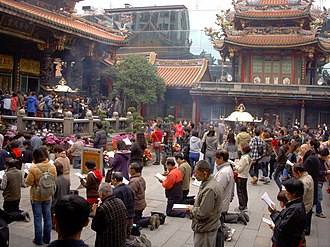Han Chinese





Han Chinese are the largest ethnic group in China, as well as the world's largest single ethnic group, constituting approximately 18% of the global human population. The Han Chinese are known for their rich culture, history, and contributions to both ancient and modern advancements in art, science, philosophy, and technology.
Origins and History[edit]
The origins of the Han Chinese can be traced back to the Huaxia people, who lived along the Yellow River in what is now modern-day China. Over centuries, the Huaxia people gradually merged and assimilated with various indigenous groups and nomadic tribes in the region, leading to the formation of the Han ethnic identity. The name "Han" comes from the Han Dynasty (206 BCE – 220 CE), a period known for its significant cultural and technological advancements, which played a crucial role in shaping Chinese civilization.
Language and Dialects[edit]
The Han Chinese speak various dialects of the Chinese language, which belong to the Sino-Tibetan language family. The most widely spoken dialect is Mandarin Chinese, which serves as the official language of the People's Republic of China and Taiwan. Other major dialects include Cantonese, Shanghainese, and Hokkien, among others. Despite the diversity in dialects, the written Chinese language, using Chinese characters, provides a common medium for communication across different linguistic regions.
Culture[edit]
Han Chinese culture is vast and encompasses a wide range of traditions, customs, and practices. This includes Chinese cuisine, which varies greatly from region to region, Chinese calligraphy, Chinese painting, and traditional Chinese music and dance. Important festivals celebrated by the Han Chinese include the Chinese New Year, the Mid-Autumn Festival, and the Dragon Boat Festival. Confucianism, Taoism, and Buddhism have significantly influenced Han Chinese philosophy, ethics, and religion.
Family and Social Structure[edit]
The traditional Han Chinese social structure is based on Confucian principles, emphasizing respect for elders, filial piety, and the importance of family. The family unit is central to Han Chinese society, with extended families often living together or in close proximity. In recent decades, economic development and urbanization have led to changes in family structure, with an increase in nuclear families.
Contributions to Humanity[edit]
The Han Chinese have made countless contributions to the world in various fields. In ancient times, they invented papermaking, the compass, gunpowder, and printing technology. Chinese literature, with its vast collection of poetry, novels, and philosophical texts, has had a profound impact on world literature. In the realms of science and technology, ancient Chinese astronomers, mathematicians, and engineers made significant advancements that influenced subsequent developments around the world.
Demographics[edit]
Today, the majority of Han Chinese reside in the People's Republic of China and Taiwan, with significant populations in Singapore, Malaysia, and other parts of Southeast Asia. There are also large diaspora communities in the United States, Canada, Australia, and Europe. Despite the geographical dispersion, Han Chinese maintain a strong sense of cultural identity and heritage.
Challenges[edit]
In the modern era, the Han Chinese face various challenges, including issues related to urbanization, environmental degradation, and social inequality. The rapid pace of economic development in China has led to significant social changes, with both positive and negative impacts on traditional Han Chinese culture and society.
Ad. Transform your life with W8MD's Budget GLP-1 injections from $75


W8MD offers a medical weight loss program to lose weight in Philadelphia. Our physician-supervised medical weight loss provides:
- Weight loss injections in NYC (generic and brand names):
- Zepbound / Mounjaro, Wegovy / Ozempic, Saxenda
- Most insurances accepted or discounted self-pay rates. We will obtain insurance prior authorizations if needed.
- Generic GLP1 weight loss injections from $75 for the starting dose.
- Also offer prescription weight loss medications including Phentermine, Qsymia, Diethylpropion, Contrave etc.
NYC weight loss doctor appointmentsNYC weight loss doctor appointments
Start your NYC weight loss journey today at our NYC medical weight loss and Philadelphia medical weight loss clinics.
- Call 718-946-5500 to lose weight in NYC or for medical weight loss in Philadelphia 215-676-2334.
- Tags:NYC medical weight loss, Philadelphia lose weight Zepbound NYC, Budget GLP1 weight loss injections, Wegovy Philadelphia, Wegovy NYC, Philadelphia medical weight loss, Brookly weight loss and Wegovy NYC
|
WikiMD's Wellness Encyclopedia |
| Let Food Be Thy Medicine Medicine Thy Food - Hippocrates |
Medical Disclaimer: WikiMD is not a substitute for professional medical advice. The information on WikiMD is provided as an information resource only, may be incorrect, outdated or misleading, and is not to be used or relied on for any diagnostic or treatment purposes. Please consult your health care provider before making any healthcare decisions or for guidance about a specific medical condition. WikiMD expressly disclaims responsibility, and shall have no liability, for any damages, loss, injury, or liability whatsoever suffered as a result of your reliance on the information contained in this site. By visiting this site you agree to the foregoing terms and conditions, which may from time to time be changed or supplemented by WikiMD. If you do not agree to the foregoing terms and conditions, you should not enter or use this site. See full disclaimer.
Credits:Most images are courtesy of Wikimedia commons, and templates, categories Wikipedia, licensed under CC BY SA or similar.
Translate this page: - East Asian
中文,
日本,
한국어,
South Asian
हिन्दी,
தமிழ்,
తెలుగు,
Urdu,
ಕನ್ನಡ,
Southeast Asian
Indonesian,
Vietnamese,
Thai,
မြန်မာဘာသာ,
বাংলা
European
español,
Deutsch,
français,
Greek,
português do Brasil,
polski,
română,
русский,
Nederlands,
norsk,
svenska,
suomi,
Italian
Middle Eastern & African
عربى,
Turkish,
Persian,
Hebrew,
Afrikaans,
isiZulu,
Kiswahili,
Other
Bulgarian,
Hungarian,
Czech,
Swedish,
മലയാളം,
मराठी,
ਪੰਜਾਬੀ,
ગુજરાતી,
Portuguese,
Ukrainian


